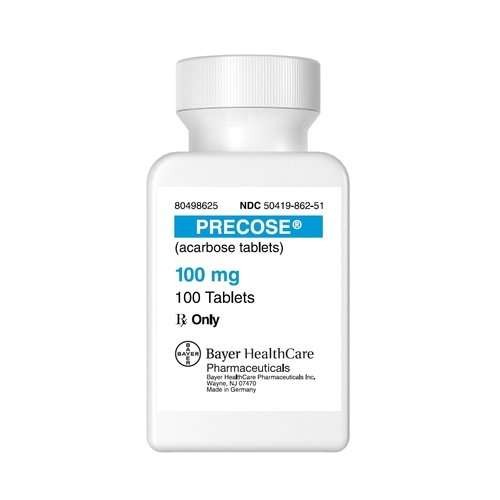
acarbose – oral, Precose
Medication Uses: Acarbose is used with a proper diet and exercise program to control high blood sugar in people with type 2 diabetes. It helps prevent kidney damage, blindness, nerve problems, loss of limbs, and sexual function problems associated with high blood sugar. Proper control of diabetes may also lower the risk of a heart attack or stroke. Acarbose works by slowing the breakdown of starch (carbohydrates) from the food you eat into sugar, preventing a significant rise in blood sugar levels after a meal. It may be used with other medications to control diabetes.
How To Use: Take this medication by mouth, usually 3 times a day at the start of each main meal or as directed by your doctor. The dosage is based on your medical condition, weight, and response to therapy. Your doctor may gradually increase your dose to determine the most effective dosage for you. The manufacturer recommends not exceeding 300 milligrams per day. Use this medication regularly to get the most benefit from it. Take it at the same times each day. Continue to eat a proper diet, exercise regularly, and check your urine/blood sugar levels as directed by your doctor for best results.
Side Effects: Side effects such as diarrhea, gas, upset stomach, constipation, or stomach pain may occur in the first few weeks of treatment but usually improve with time. Follow your prescribed diet to help lessen these effects. If side effects persist or worsen, inform your doctor or pharmacist promptly. Serious side effects are rare but may include unusual tiredness, persistent nausea/vomiting, severe stomach/abdominal pain, rectal bleeding, yellowing eyes/skin, dark urine. Acarbose does not cause low blood sugar, but it may occur if taken with other anti-diabetic drugs. Symptoms of low blood sugar include cold sweat, blurred vision, dizziness, drowsiness, shaking, fast heartbeat, headache, fainting, tingling of the hands/feet, and hunger. To prevent low blood sugar, eat meals regularly and do not skip them. Symptoms of high blood sugar include thirst, increased urination, confusion, drowsiness, flushing, rapid breathing, and fruity breath odor. If these symptoms occur, inform your doctor immediately. This is not a complete list of possible side effects. Contact your doctor for medical advice about side effects.
Precautions: Inform your doctor or pharmacist if you are allergic to acarbose or have any other allergies. This medication should not be used if you have certain medical conditions, such as severe liver disease or bowel problems. Before using acarbose, discuss your medical history with your doctor, especially if you have kidney disease. Avoid driving, using machinery, or engaging in activities that require alertness or clear vision while taking this medication. Limit alcoholic beverages as they can increase the risk of low blood sugar. Stressful situations may make it harder to control your blood sugar, so consult your doctor if you experience significant stress. This medication should be used during pregnancy only if clearly needed. Consult your doctor before breastfeeding.
Drug Interactions: Do not start, stop, or change the dosage of any medicine without consulting your doctor or pharmacist. This drug should not be used with certain medications such as activated charcoal or digestive enzyme products. Inform your doctor of all prescription and nonprescription/herbal products you are using, especially pramlintide. Beta-blocker medications may prevent the fast/pounding heartbeat associated with low blood sugar. Many drugs can affect blood sugar levels, so discuss any medication changes with your doctor or pharmacist and regularly check your blood sugar levels.
QUESTION
Overdose: If overdose is suspected, contact a poison control center or emergency room immediately.
Notes: Do not share this medication with others. Attend a diabetes education program to learn more about diabetes and its treatment. Keep all medical appointments and perform necessary tests to monitor your response to therapy. If you miss a dose, take it as soon as you remember. If it is near the time of the next dose, skip the missed dose. Store the medication at room temperature and consult your pharmacist for proper disposal.
Report Problems to the Food and Drug Administration
If you experience negative side effects from this medication, report them to the FDA.
This information is intended to supplement, not substitute for, the expertise and judgment of healthcare professionals. It does not cover all possible uses, directions, precautions, drug interactions or adverse effects. Consult a healthcare professional before taking any drug or changing your diet or treatment plan.


